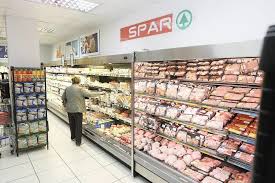South African retail giant SPAR Group says it plans to grow its business by expanding its product selection, increasing sales of own-brand goods, and boosting on-demand delivery services, as competition in the grocery space heats up across Southern Africa.
The company made this known following its latest half-year financial report which showed flat group revenue and a slight drop in earnings. Despite the challenging environment, SPAR is optimistic about its strategy for sustainable growth.
SPAR CEO Angelo Swartz, speaking to investors, said the group’s future growth in Southern Africa lies in offering more value-driven and diverse products, enhancing digital convenience, and selling more SPAR-branded items which are typically priced lower than branded alternatives.
“We want to return to growth in a way that protects our margins and promotes long-term sustainability,” Swartz said. “That means giving our customers what they want — quality, affordability, and ease of access.”
As part of this drive, SPAR is leaning into its partnership with Uber Eats, using it to expand its on-demand delivery services, especially in urban centres where demand for fast, convenient shopping is rising.
The group also revealed plans to continue investing in customer convenience, particularly through digital platforms that allow online shopping and delivery. These are becoming more popular among time-pressed, cost-conscious shoppers.
In addition to retail expansion, SPAR is investing in the health sector, specifically SPAR Health. The company is setting up new pharmacist training centres to support a growing pharmacy network, with the goal of doubling its footprint by 2028.
SPAR’s Financial Performance
For the six months ending March 28, 2025, SPAR reported:
Headline earnings per share (HEPS) down 0.4% to 450.1 cents.
Group revenue from continuing operations flat at R66.1 billion (about $3.7 billion).
Operating profit up 1.6% to R1.5 billion, driven by cost controls.
Operating margin steady at 2.2%.
In Southern Africa, where SPAR earns the majority of its revenue, the company recorded:
A 1.7% increase in wholesale turnover to R49.9 billion.
Grocery and liquor wholesale revenue up 1.1%.
Retail revenue grew by 1.9%, with like-for-like sales up 1.6%.
Swartz noted that growth in this region is being supported by stronger performance in the lower-income customer segment, where shoppers are increasingly drawn to value-focused retailers.
Challenges Abroad
While the Southern Africa business remains stable, SPAR’s international operations have been under pressure. The company announced it has put both SPAR Switzerland and SPAR UK up for sale, after those businesses recorded combined post-tax losses of R4.4 billion, including impairments of R4.2 billion.
This move is part of a broader strategy to focus on core profitable markets, and cut losses from underperforming international units.
SPAR, founded in 1963, operates as a wholesale and retail distributor and serves over 900 independently owned SPAR stores across Southern Africa. The retailer is one of the largest grocery chains in the region, competing with Shoprite, Pick n Pay, and Woolworths, all of which have ramped up their services to meet evolving consumer demands.
In recent years, South Africa’s retail space has become more competitive, with price-conscious consumers increasingly looking for affordability, quality, and speed. Companies that fail to keep up with digital innovation and evolving customer preferences risk losing ground.
Looking Ahead
Despite economic headwinds such as inflation, high interest rates, and rising operational costs, SPAR says it is focused on long-term transformation, digital investment, and building consumer trust through value-driven offerings.
The company remains committed to its core South African market, while working on an exit strategy for its struggling European operations.
Retail analysts suggest that SPAR’s shift toward own-brand products, digital convenience, and pharmacy services could help the group reclaim market share, particularly among young and middle-income shoppers who are keen on affordable and tech-enabled retail options.
